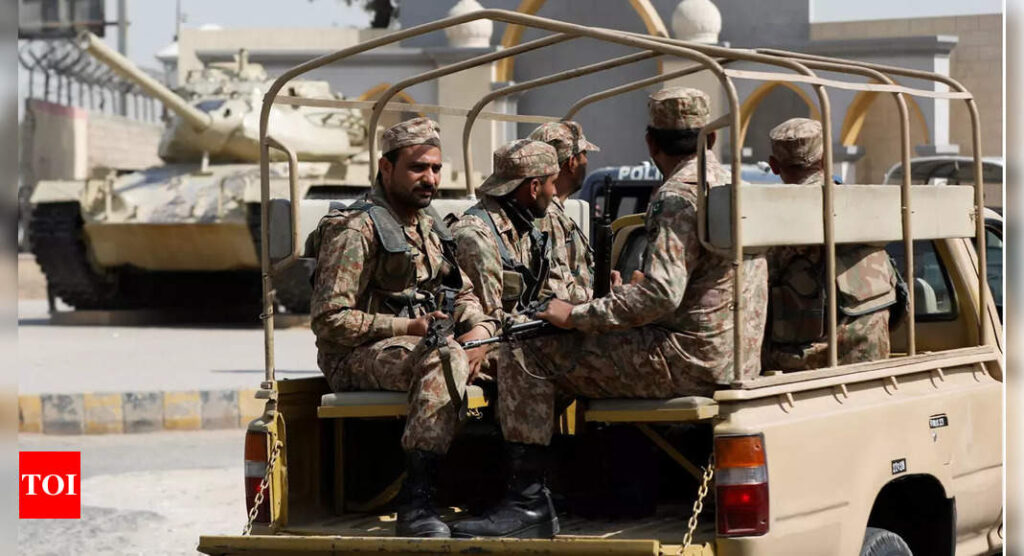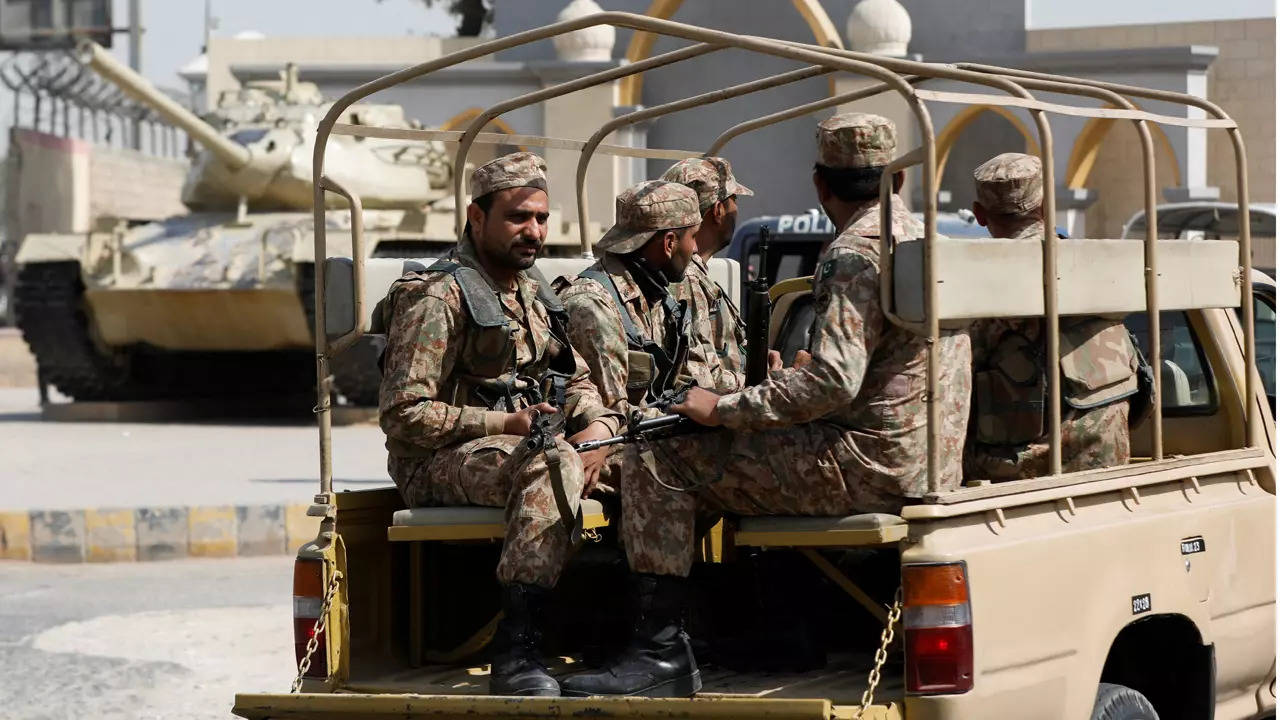[ad_1]
NEW DELHI: The all-powerful army in Pakistan, which has ruled the country for nearly half of its independent history, is used to playing the role of both – the nation’s guardian as well as its governing administration.
Now, the military is getting ready to don a new hat in an effort to wade the country out of its months-long economic mistery.
According to a report in Nikkei Asia, Pakistan’s army is taking over large swaths of government-owned land to grow food for the poverty-stricken masses.
However, the move has stoked concerns about the military’s “pervasive presence” in a country facing economic collapse.
Trading tanks for tractors
The new food security push, which was launched earlier this year by a joint civil-military investment body, plans to boost crop production through army-run farms on leased state land, the report said.
According to the plan, the army will acquire up to 1 million acres (405,000 hectares) of land in Pakistan’s Punjab province. That’s nearly three times the size of Delhi.
Those backing the plan have promised that it will generate better crop yields and save water. Something that Pakistan desperately needs amid depleting foreign exchange reserves and rising commodity prices.
Documents show that the army will be granted leases for up to 30 years to grow crops such as wheat, cotton and sugar cane, as well as vegetables and fruit.
Around 20% of the profit generated from selling the crops will be earmarked for farming research and development. The rest will be divided equally between the army and state government, Nikkei Asia reported citing leaked government documents.
However, the plan is also facing challenges as well as criticism from various quarters.
Many have raised concerns that the military, which is already a powerful entity, could gain massive profits from the food-security push and further deprive Pakistan’s 25 million rural landless poor.
Critics told Nikkei Asia that the latest transfer could cement Pakistan’s military as the country’s single-biggest landowner.
“The job of the army is to protect against external threats and come to the aid of the civilian government when requested to do so. Nothing more, nothing less,” Rafay Alam, an environmental lawyer, told Nikkei Asia.
Blueprint unclear
What has added to the concerns is the ambiguity surrounding the blueprint.
It is still unclear when these farms will be fully operations.
Many details of the blueprint remain unclear, including when the farms will be fully operational.
According to documents seen by Nikkei Asia, most of the land is in the Cholistan Desert which is an arid region prone to water shortages.
As much as 110,000 acres of additional land for transfer is in adjacent districts, the report said.
Notably, the Lahore high court had earlier ordered a halt to the land transfer, but the decision was overturned by another bench in July.
It is also unclear if any of the land that will be transferred to the army was already being farmed or controlled by small landowners.
But the concern was dismissed by Fongrow, part of the Fauji Foundation investment group run by former Pakistani military officers.
Fongrow’s manager was quoted as saying that most of the land that is being alloted is “barren”. Thus, there is no question of farmers being displaced.
But this raises another question – how will ill-equipped army turn a desert into fertile agricultural land?
“Usually, army officers have very limited knowledge of farming … they adopt a conventional system of farming or lease out their lands to any local farmer. …There are hundreds of agricultural [school] graduates who are jobless and they have the skills to do this job,” agricultural consultant Asif Riaz Taj told Nikkei Asia.
Moreover, the report said past experience with army farms has raised eyebrows with several incidents of military owners exploiting poor farmers.
According to a lawyer, the policy documents of the Pakistani government suggest a different approach to addressing food shortages.
The lawyer said that according to the government, food security can be improved by investing in small farmers and giving them the necessary skills.
Instead, the military, which already has an outsized influence in Pakistan, is being given more powers with an aim to enhance “national development and strategic interests.”
Now, the military is getting ready to don a new hat in an effort to wade the country out of its months-long economic mistery.
According to a report in Nikkei Asia, Pakistan’s army is taking over large swaths of government-owned land to grow food for the poverty-stricken masses.
However, the move has stoked concerns about the military’s “pervasive presence” in a country facing economic collapse.
Trading tanks for tractors
The new food security push, which was launched earlier this year by a joint civil-military investment body, plans to boost crop production through army-run farms on leased state land, the report said.
According to the plan, the army will acquire up to 1 million acres (405,000 hectares) of land in Pakistan’s Punjab province. That’s nearly three times the size of Delhi.
Those backing the plan have promised that it will generate better crop yields and save water. Something that Pakistan desperately needs amid depleting foreign exchange reserves and rising commodity prices.
Documents show that the army will be granted leases for up to 30 years to grow crops such as wheat, cotton and sugar cane, as well as vegetables and fruit.
Around 20% of the profit generated from selling the crops will be earmarked for farming research and development. The rest will be divided equally between the army and state government, Nikkei Asia reported citing leaked government documents.
However, the plan is also facing challenges as well as criticism from various quarters.
Many have raised concerns that the military, which is already a powerful entity, could gain massive profits from the food-security push and further deprive Pakistan’s 25 million rural landless poor.
Critics told Nikkei Asia that the latest transfer could cement Pakistan’s military as the country’s single-biggest landowner.
“The job of the army is to protect against external threats and come to the aid of the civilian government when requested to do so. Nothing more, nothing less,” Rafay Alam, an environmental lawyer, told Nikkei Asia.
Blueprint unclear
What has added to the concerns is the ambiguity surrounding the blueprint.
It is still unclear when these farms will be fully operations.
Many details of the blueprint remain unclear, including when the farms will be fully operational.
According to documents seen by Nikkei Asia, most of the land is in the Cholistan Desert which is an arid region prone to water shortages.
As much as 110,000 acres of additional land for transfer is in adjacent districts, the report said.
Notably, the Lahore high court had earlier ordered a halt to the land transfer, but the decision was overturned by another bench in July.
It is also unclear if any of the land that will be transferred to the army was already being farmed or controlled by small landowners.
But the concern was dismissed by Fongrow, part of the Fauji Foundation investment group run by former Pakistani military officers.
Fongrow’s manager was quoted as saying that most of the land that is being alloted is “barren”. Thus, there is no question of farmers being displaced.
But this raises another question – how will ill-equipped army turn a desert into fertile agricultural land?
“Usually, army officers have very limited knowledge of farming … they adopt a conventional system of farming or lease out their lands to any local farmer. …There are hundreds of agricultural [school] graduates who are jobless and they have the skills to do this job,” agricultural consultant Asif Riaz Taj told Nikkei Asia.
Moreover, the report said past experience with army farms has raised eyebrows with several incidents of military owners exploiting poor farmers.
According to a lawyer, the policy documents of the Pakistani government suggest a different approach to addressing food shortages.
The lawyer said that according to the government, food security can be improved by investing in small farmers and giving them the necessary skills.
Instead, the military, which already has an outsized influence in Pakistan, is being given more powers with an aim to enhance “national development and strategic interests.”
[ad_2]
Source link











More Stories
We can’t wait to face India in the final: Pat Cummins | Cricket News
Railways plans 3,000 additional trains in next 4-5 years to minimise number of waitlisted tickets | India News
Faridabad: Man dies after ‘falling from hotel room window’ while partying with friends